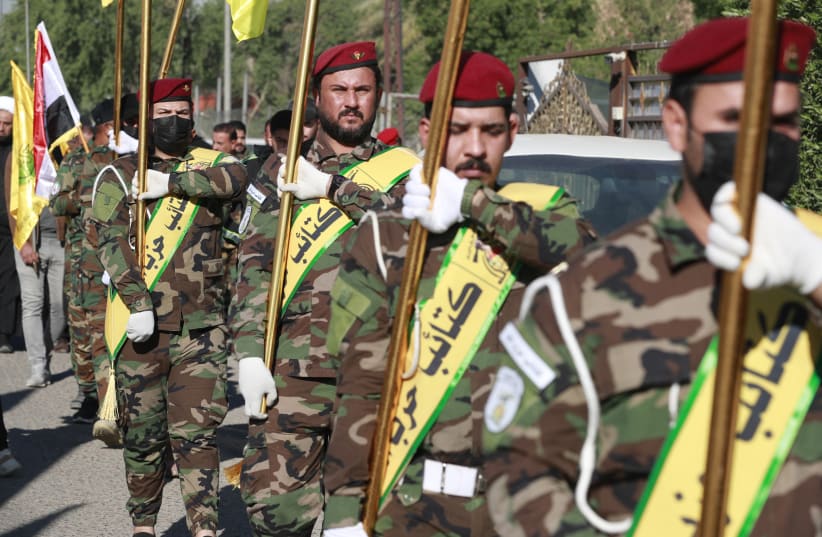In a significant shift amid rising regional tensions, multiple powerful Iran-backed Shiite militia groups in Iraq have expressed a willingness to disarm. This move is seen as a response to mounting pressure from the United States, which has warned Iraq that continued militia activity could provoke military strikes.

According to 10 senior Iraqi officials and militia commanders who spoke with Reuters, the disarmament would mark the first time such groups have seriously considered laying down their arms. The discussions reportedly involve Kataib Hezbollah, Kataib Sayyed al-Shuhada, Nujabaa, and Ansarullah al-Awfiyaa—all of which are key components of Iraq’s “Islamic Resistance.”
The shift comes after months of warnings from the U.S. to the Iraqi government that militias using Iraqi soil to target American and Israeli interests would be met with force. Sources said unless Iraq reins in these groups, they could become targets for American airstrikes.
Izzat al-Shahbndar, a prominent Shiite politician close to Iraq’s ruling alliance, described the ongoing talks between Prime Minister Mohammed Shia al-Sudani and militia leaders as “very advanced,” adding that many factions are “fully aware” of the risks of not complying with U.S. demands.
“The factions are not being stubborn. They understand that escalation would bring severe consequences,” said one commander from Kataib Hezbollah, speaking under anonymity.
Iran’s Islamic Revolutionary Guard Corps (IRGC), which is known for backing Shiite militias across the Middle East, has reportedly authorized the groups to make independent decisions in order to avoid war with the U.S. and Israel. This approval suggests a notable shift in Tehran’s posture, likely driven by recent setbacks across its Axis of Resistance.
The Islamic Resistance in Iraq—a coalition of about 10 hardline groups—commands approximately 50,000 fighters and possesses long-range missiles and anti-aircraft systems. These groups have launched dozens of drone and missile strikes on U.S. and Israeli targets since the war in Gaza escalated in late 2023.
Prime Minister Sudani’s office confirmed that efforts are underway to bring all armed groups under state control. Farhad Alaaeldin, Sudani’s foreign affairs adviser, emphasized that disarmament would be pursued through “constructive dialogue with national actors.”
Two Iraqi security officials revealed that some militias have already vacated their headquarters and scaled back operations in key cities such as Mosul and Anbar. Militia leaders have also taken extensive security precautions, including frequently changing phones, vehicles, and locations to avoid detection.
Despite encouraging signs, U.S. officials remain skeptical about the permanence of any disarmament. A U.S. State Department spokesperson reiterated the demand that “these forces must respond to Iraq’s commander-in-chief and not to Iran.”
A senior American official warned that militias have paused attacks in the past only to resume them later. The U.S. remains cautious and prepared for further military action if needed.
The apparent willingness to disarm highlights cracks in Iran’s Axis of Resistance, a decades-old network of proxy forces that has come under heavy pressure since the Israel-Hamas conflict reignited in 2023. Tehran’s regional allies—Hamas in Gaza, Hezbollah in Lebanon, and the Houthis in Yemen—have faced crippling military responses from the U.S. and Israel.
Meanwhile, the looming threat of Bashar al-Assad’s fall in Syria, another key Iranian ally, has further shaken Iran’s influence across the region.
Caught between its alliances with both Washington and Tehran, Iraq is navigating a dangerous geopolitical tightrope. U.S. Defense Secretary Pete Hegseth recently warned Sudani against allowing militia groups to launch retaliatory strikes from Iraqi soil. This follows the killing of three U.S. service members in a drone strike in Jordan last year that was attributed to Iraq-based factions.
Analyst Ibrahim al-Sumaidaie told Iraqi state TV that Washington may no longer accept delays or denials. “If we do not voluntarily comply, it may be forced upon us from the outside—and by force,” he said.
While no final agreement has been reached, options on the table include transforming the militias into political entities or formally integrating them into Iraq’s national armed forces. The outcome could mark a historic turning point in curbing the influence of non-state armed actors in Iraq—but only if the disarmament pledges are implemented and sustained.



